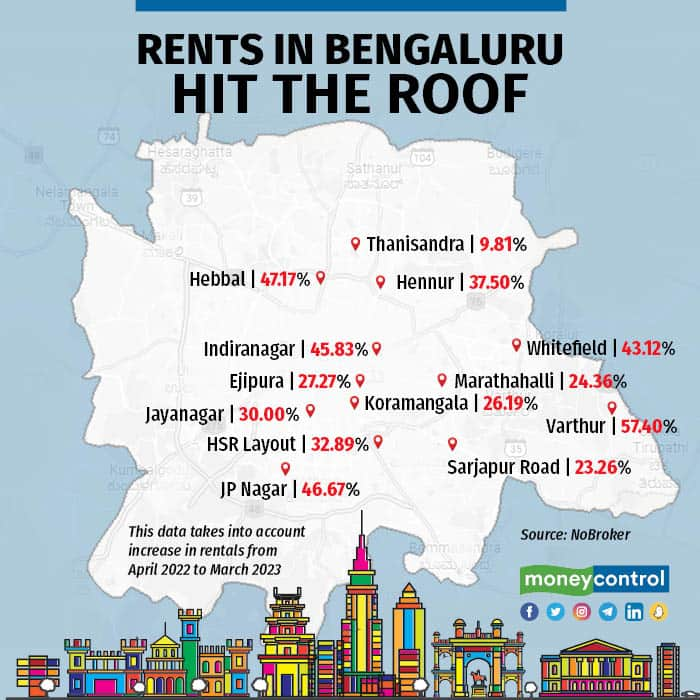



Rahul Arora (name changed), an IT professional, rented a 2BHK apartment close to Whitefield for Rs 31,000 in 2021.
At the last renewal of the rental agreement in November, the rent was increased by about Rs 1,350.
However, four months after the renewal, the landlord suddenly asked him to pay Rs 51,000, a near-40-percent hike, or vacate the house within a month.
Unable to find a house in such a short time, Arora is forced to stay at the same place, paying a higher rent.
Amid soaring rentals and crunching demand, Bengaluru’s tenants are facing unreasonable demands from landlords trying to recoup the money they lost during the coronavirus pandemic when tenants had gone back home.
The millennials in Bengaluru are well-acquainted with the notorious demands of landlords, including the no-bachelor policy to food habits.
Moneycontrol spoke to advocates to understand the rights of tenants, especially in cases of landlords suddenly hiking rentals in the middle of the year.

Bizarre rental agreements
One rental agreement of an apartment in Whitefield accessed by Moneycontrol made sure that the tenants left the place after having fully painted, "deep cleaned and pest-controlled" it at the cost of the tenant.
There are more such tales.
Sangita Ranjan (name changed) recently left an apartment close to HSR Layout with a deposit of Rs 50,000.
Though her rental agreement says that a month's rent will be deducted on account of painting charges when she leaves, she said, "I did not get a single penny back."
"The landlord came to my place with a magnifying glass to make sure he deducts money from my deposit for every little scratch in the apartment," she lamented.
Another agreement prohibits the tenant from smoking or consuming alcohol inside the apartment. Luckily, the agreement allowed non-vegetarian food, sans beef though.
The agreement also prohibited the tenants from keeping domestic or "wild" animals, including birds, inside the premises.
The agreement also clarifies that only the "legal husband" of the tenant will be allowed to stay in the apartment.
In another case, Sayoni Banerjee (name changed), said, "According to my agreement, I have to leave a soap and a bottle of acid wash in the washroom. Also, I cannot go into any relationship with the landlord, 'under any circumstances'."
However, Banerjee points out that the agreement mentions that the landlord can come at any time to inspect the house and cannot be stopped "by force".
Advocates say before signing any rental contract, every tenant should read through the terms and conditions to prevent further harassment in the future.
Tenants' rights
Akash Bantia, an advocate, clarified that the landlords cannot breach the terms of the rental agreement even in the matter of hiking rents in the middle of the year.
"Every party signing the agreement is bound under the Indian Contract Act, 1872 and sudden hikes in rent without completion of the agreement period amounts to a breach of contract," Bantia added.
Advocates say in cases when personal mediations fail, the tenant can approach a lawyer to send a legal notice to the landlord for a breach of contract.
"In fact, the tenants can also file an interim order at the civil court asking for a stay in cases where they have been asked to vacate. This order will be in effect immediately and will cost about Rs 12,000 - Rs 15,000, against the high rentals tenants are paying," Bantia added.
Even if the civil cases drag on for years, at least the tenants will be able to stay in the apartment under the interim order till the date of renewal, Srinivas V, another advocate added.
Government hits and misses
Advocates say to date, no policies exist in Karnataka to protect the rights of tenants in such cases.
Approved by the Union Cabinet on June 2, 2021, the Model Tenancy Act (MTA) provides for regulating the tenancy terms and conditions while bringing transparency between the parties. The Act establishes a Rent Authority and Rent Court in every state and union territory to address grievances and solve disputes.
The Act says the rental deposit should "not exceed two months’ rent in the case of residential premises, and not exceed six months’ rent in the case of non-residential premises".
However, land, urban development, and real estate are state subjects. Hence, the Act is left to the state governments to be implemented.
In July 2022, Minister of State for Housing and Urban Affairs Kaushal Kishore said in a written reply to a question in Rajya Sabha, "As per information available with MoHUA, the States of Andhra Pradesh, Tamil Nadu, Uttar Pradesh and Assam have revised the Tenancy Acts on the lines of MTA."
Srinivas added, "The state has Karnataka Rent Act, 1999. However, it only applies to properties with a monthly rent of up to Rs 3,500, and is largely unusable for Bengaluru.”
The government of Karnataka has been mulling legislating the MTA in the state. However, it has been delayed now for several years.
Advocates say such checks are needed in a city like Bengaluru, with its exploding real estate sector. "Like we have RERA to protect the homebuyers, the tenants' situation will explode if the government does not intervene," they added.
Discover the latest Business News, Sensex, and Nifty updates. Obtain Personal Finance insights, tax queries, and expert opinions on Moneycontrol or download the Moneycontrol App to stay updated!